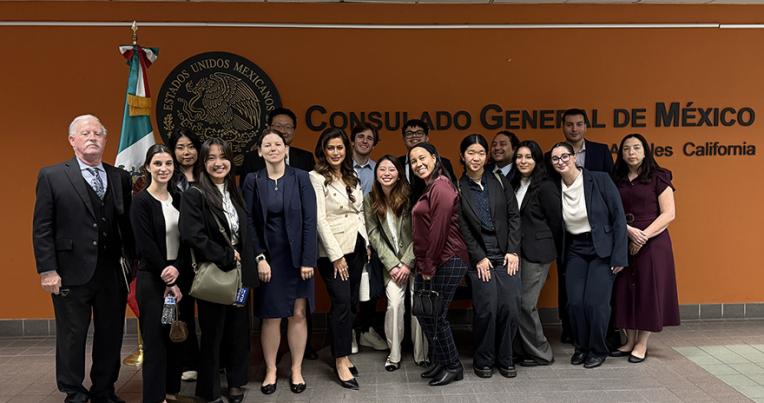Here in Europe
Welcome! Explore our website to learn more about our research, events, and educational programs, and discover how we advance international law and human rights from our office in Europe.
…and in Los Angeles
Looking for our office in Los Angeles?
Visit The Promise Institute for Human Rights at UCLA School of Law to learn more about their programs, faculty, and student opportunities.
The Promise Institute for Human Rights (Europe) was established in 2023 and is based at the Amsterdam Law School, with classroom space in The Hague. We advance cutting-edge legal research and analysis in international law and human rights, especially where these intersect with the urgent need to protect our planet.
Our UCLA Law in The Hague program places current UCLA Law students in distinguished externships at tribunals, courts, and international organizations such as the International Court of Justice, the International Development Law Organisation, the Kosovo Specialist Chambers, and the International Residual Mechanism for Criminal Tribunals.
Through our research, worldwide collaborations, and immersive learning opportunities, we are shaping international law and policy while training the next generation of justice leaders.
The Promise Europe works closely with our office in Los Angeles, established in 2017.
The Promise Institute for Human Rights Annual Report, 2025
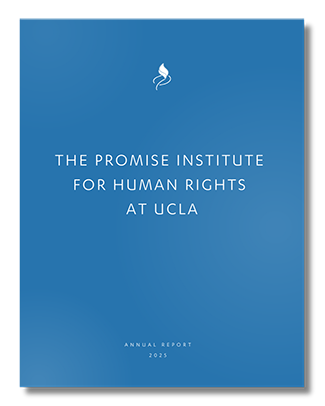 The Promise Institute for Human Rights at UCLA is pleased to present the 2025 Annual Report reflecting our work in both Los Angeles and Europe. We remain committed to uniting people around our shared mission to advance human rights and empower the next generations of lawyers, leaders, and advocates.
The Promise Institute for Human Rights at UCLA is pleased to present the 2025 Annual Report reflecting our work in both Los Angeles and Europe. We remain committed to uniting people around our shared mission to advance human rights and empower the next generations of lawyers, leaders, and advocates.
Read The Promise Institute's 2025 Annual Report here.
Student Opportunities
UCLA Law students interested in international law and human rights can spend a semester interning in The Hague, visit the U.N. in Geneva, and more.
UCLA Law students can remotely participate in legal advisory and advocacy projects alongside international partners.
Students reflect on their experiences in the international program and collaborating with The Promise Europe to drive real-world change.
This three-week UCLA Law course explores the potential and limitations of international human rights and criminal law in protecting the environment.
UCLA Law Students can work remotely with the Promise Institute for Human Rights (Europe) team, while Amsterdam Law students can apply for on-campus roles.
Starting in 2025, JD candidates at UCLA Law and Amsterdam Law School (UvA) students can apply to spend a semester at the other institution.
In this intensive course, UCLA Law students use human-centered design, systems thinking, and storytelling to create innovative solutions for human rights challenges.
UCLA and UvA law students contributed greatly to our 2024 launch conference, and we look forward to more students joining our future symposia.
Who We Are
-
Team
Anna Spain Bradley
MacArthur Foundation Chair in International Justice and Human Rights
Professor of Law
Special Advisor for Strategic Planning and Values to the EVC/P (2023-24)
UCLA Vice Chancellor for Equity, Diversity and Inclusion (2020-23)Kate Mackintosh
Executive Director, UCLA Law Promise Institute Europe
Professor from PracticeAmanda Brown
Legal AssociateXuchen Zhang
Legal AssociateJeanine Hovius
CommunicationsAyodele Babalola
UCLA Research AssistantJohn Dover
UCLA Research Assistant -
Fellows
Lisa Nicole Oldring
Lisa Oldring is a Senior Fellow with the UCLA Law Promise Institute for Human Rights (Europe) and a doctoral candidate at the University of Amsterdam Faculty of Law. Her research focuses on the crime of ecocide from a human rights perspective. Oldring is an international human rights lawyer with over twenty years of practice at the global level, primarily with the United Nations Human Rights Office. As a senior advisor on human rights and security based in Geneva, she led the Office’s work on issues including counter-terrorism, global surveillance practices, and the use of force. She has served as legal advisor to UN-mandated commissions of inquiry on Darfur, Sudan and on Lebanon; Special Advisor to Mary Robinson (Chair, GAVI Board) in New York; advisor to the first UN Special Rapporteur on the right to health; and attaché to the International Committee of the Red Cross. She began her UN work in the post-conflict human rights field operation in Rwanda. Oldring holds a BA in Criminology (1992) and an LLB (1995) from the University of Alberta, and a graduate degree (D.E.S.) in international law from the Geneva Graduate Institute (1999). -
Affiliated Faculty
Richard L. Abel
Michael J. Connell Distinguished Professor of Law Emeritus
Distinguished Research ProfessorKhaled M. Abou El Fadl
Omar and Azmeralda Alfi Professor of LawAhilan Arulanantham
Professor from Practice
Faculty Co-Director, Center for Immigration Law & PolicyLaToya Baldwin Clark
Professor of LawJoseph Berra
Human Rights in the Americas Project DirectorWilliam Boyd
Professor of Law
Michael J. Klein Chair in Law
Faculty Co-Director, Emmett Institute on Climate Change and the EnvironmentDevon W. Carbado
The Honorable Harry Pregerson Professor of LawAnn E. Carlson
Shirley Shapiro Professor of Environmental Law
Faculty Director, Emmett Institute on Climate Change & the EnvironmentKimberlé W. Crenshaw
Distinguished Professor of Law
Promise Institute Chair in Human RightsIngrid Eagly
Professor of Law
Faculty Co-Director, Criminal Law & Policy ConsortiumStephen Gardbaum
Stephen Yeazell Endowed Chair in LawCarole E. Goldberg
Distinguished Research Professor
Jonathan D. Varat Distinguished Professor of Law EmeritaLaura E. Gómez
Professor of Law Emerita
Rachel F. Moran Endowed Chair in LawSean B. Hecht
Evan Frankel Professor of Policy and PracticeCara Horowitz
Andrew Sabin Family Foundation Executive Director of the Emmett Institute on Climate Change and the Environment
Director, Frank G. Wells Environmental Law ClinicJasleen Kohli
Executive Director, Critical Race Studies ProgramMáximo Langer
David G. Price and Dallas P. Price Professor of Law
Director of the UCLA Transnational Program on Criminal JusticeKate Mackintosh
Executive Director, UCLA Law Promise Institute Europe
Professor from PracticeHiroshi Motomura
Susan Westerberg Prager Distinguished Professor of Law
Faculty Co-Director, Center for Immigration Law and PolicyEdward A. Parson
Dan and Rae Emmett Professor of Environmental Law
Faculty Director, Emmett Institute on Climate Change and the EnvironmentSunita Patel
Professor of Law
Faculty Director, Faculty Director of the David J. Epstein Program in Public Interest Law & Policy
Faculty Director, UCLA Veterans Legal ClinicJessica Peake
Director, International and Comparative Law ProgramNina Rabin
Clinical Professor of Law
Director of Clinical Education
Director, Immigrant Family Legal ClinicKal Raustiala
Promise Institute Distinguished Professor of Comparative and International Law
Professor at the UCLA International Institute
Director, UCLA Ronald W. Burkle Center for International Relations
Faculty Director, International and Comparative Law ProgramPeter L. Reich
Continuing Lecturer in Law
Director, Law & Communication IntensiveAngela R. Riley
Carole Goldberg Endowed Chair of Native American Law
Special Advisor to the Chancellor on Native American and Indigenous Affairs
Director, Native Nations Law & Policy CenterJames Salzman
Donald Bren Distinguished Professor of Environmental LawRobert Bradley Sears
Associate Dean of Public Interest Law
Roberta A. Conroy Distinguished Scholar of Law & Policy, The Williams Institute
Founding Executive Director, The Williams InstituteAnna Spain Bradley
MacArthur Foundation Chair in International Justice and Human Rights
Professor of Law
Special Advisor for Strategic Planning and Values to the EVC/P (2023-24)
UCLA Vice Chancellor for Equity, Diversity and Inclusion (2020-23)Lara Stemple
Assistant Dean for Graduate Studies and International Student ProgramsKatherine Stone
Distinguished Arjay and Frances Fearing Miller Professor EmeritaCatherine Sweetser
Deputy Director, Promise Institute for Human Rights
Director, Human Rights Litigation ClinicSherod Thaxton
Professor of Law
Professor of African American Studies (by courtesy)
Professor of Public Policy (by courtesy)
Professor of Sociology (by courtesy)Lauren van Schilfgaarde
Assistant Professor of LawAlex Wang
Professor of Law
Walter and Shirley Wang Chair in U.S.-China Relations and Communications
Faculty Co-Director, Emmett Institute on Climate Change & the EnvironmentNoah D. Zatz
Professor of Law and Labor StudiesEric M. Zolt
Michael H. Schill Distinguished Professor of Law
Areas of Work
-
HUMAN RIGHTS, CLIMATE CHANGE AND ECOLOGICAL CRISES
 Alberta Tar Sands: Submission to UN Special Rapporteur on the Right to Water
Alberta Tar Sands: Submission to UN Special Rapporteur on the Right to WaterOver the last decades, oil giants like ExxonMobil have developed the Alberta Tar Sands into one of the largest industrial operations on the planet, causing severe and ongoing harm to the environment and to life. Energy-intensive oil extraction and high-emission processing centers have caused serious damage to human health and local cultures, particularly in First Nations communities, where cancer rates have spiked, air can be painful to breathe, and traditional economies have been destroyed. The Tar Sands operations have also fueled climate change and have caused widespread, long-term environmental destruction, including through deforestation, air pollution, water contamination, and dire threats to native species and ecosystems. The area of damage is already larger than the size of England, and it continues to grow.
In connection with the visit of the UN Special Rapporteur on the human rights to safe drinking water and sanitation to Canada in April 2024, The Promise Europe Senior Fellow Lisa Oldring, Executive Director Kate Mackintosh, and research assistant Kim McNamara Hamilton submitted a briefing memo to the Special Rapporteur outlining how the Alberta Tar Sands operations might amount to ecocide.
Lisa and Kate are expanding upon this briefing memo in an article for the upcoming special issue of the International Journal of Human Rights on “Ecocide, Human Rights, and Environmental Justice”.
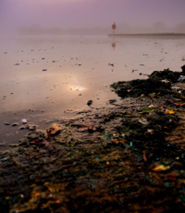 ‘A Very English Water Crisis’: Submission to UN Special Rapporteur on the Right to a Healthy Environment
‘A Very English Water Crisis’: Submission to UN Special Rapporteur on the Right to a Healthy EnvironmentIn July 2024, Legal Associate of The Promise Europe, Xuchen Zhang and Kate Mackintosh collaborated with Jack Sproson, Tomas Hamilton and Gregory Chilson of the Guernica 37 Group to submit a briefing to the Special Rapporteur on the Human Right to a Clean, Healthy and Sustainable Environment, Astrid Puentes Riaño. The submission has been considered in her annual report to the Human Rights Council.
The submission, titled 'A Very English Water Crisis', focuses on the UK's failure to meet its obligations with respect to the right to safe and sufficient water, a component of the right to a healthy environment. It highlights widespread pollution of UK waterways due to illegal sewage dumping by privatized water companies, inadequate regulation, and the negative impacts of privatization. It criticizes the British government's unwillingness to address systemic issues, comply with international environmental standards, and provide effective legal remedies. It calls for stronger enforcement, infrastructure upgrades, and consideration of the proposed UK Ecocide Bill currently in the House of Lords.
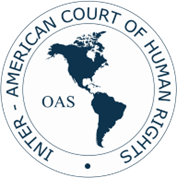 The Climate Emergency and Human Rights: Submission to the Inter American Court of Human Rights
The Climate Emergency and Human Rights: Submission to the Inter American Court of Human RightsIn December 2023, team members and students of The Promise Institute in LA and Europe submitted an amicus brief to the Inter-American Court of Human Rights, in the context of the request for an advisory opinion on the climate emergency and human rights submitted by Colombia and Chile. This brief was prepared by Professors Tendayi Achiume, Joe Berra, Kate Mackintosh and Priya Morley, along with students Paula Angarita Tovar, Mollie Cueva-Dabkoski, Heliya Izadpanah, and Annika Krafcik.
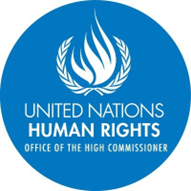 Human Rights and the Crime of Ecocide: Conversations with the OHCHR and UN Special Procedures
Human Rights and the Crime of Ecocide: Conversations with the OHCHR and UN Special ProceduresWe continue to explore the intersections of economic, social and cultural rights with the crime of ecocide. In March 2024, we co-organized a roundtable discussion on these issues with the Office of the UN High Commissioner for Human Rights and UN Special Procedures experts in Geneva. This event followed earlier calls by the High Commissioner for Human Rights and the UN Secretary-General for ecocide to be defined as a crime under international law. Discussions are scheduled to continue in 2025.
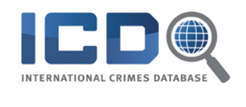 Ecocide and Human Rights: Forthcoming Book Chapter
Ecocide and Human Rights: Forthcoming Book ChapterSenior Fellow Lisa Oldring and Executive Director Kate Mackintosh have authored a book chapter, “The Crime of Ecocide Through Human Rights: Towards Environmental Prevention, Protection and Justice”, in Burgers et al. (eds.), Ecocide: Criminalising harm against the environment (T.M.C. Asser Press/Springer Verlag, forthcoming). The book chapter builds upon a related brief on ecocide that Oldring and Mackintosh contributed to the Asser Institute’s International Crimes Database in 2022.
 UCLA Law Course: Human Rights and the Protection of the Environment
UCLA Law Course: Human Rights and the Protection of the EnvironmentThis three-week course (LAW 472) examines the evolving potential and limitations of international human rights and criminal law in addressing environmental challenges, focusing on recent legal developments and considering the links between human health, well-being, and the broader ecosystem.
-
A New International Crime of Ecocide
 Convening Expertise for a Legal Definition
Convening Expertise for a Legal DefinitionIn September 2024, the Pacific Island States of Vanuatu, Fiji, and Samoa officially submitted a proposal to add a fifth crime - ecocide - to the Statute of the International Criminal Court. The faculty and students of the Promise Institutes have played a significant role in the lead up to this historic moment.
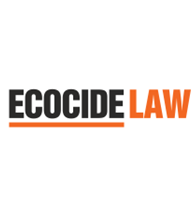 EcocideLaw.com
EcocideLaw.comWe partnered with Stop Ecocide and the Human Rights Consortium at the University of London’s School of Advanced Study to create this comprehensive legal and historical resource on ecocide law. Visit the site to find an annotated bibliography, online symposia, existing and proposed laws and more.
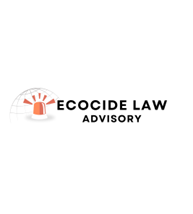 Ecocide Law Advisory
Ecocide Law AdvisoryEcocide Law Advisory is a partnership between The Promise Institute Europe and NGO Climate Counsel to provide expert legal advice and training on the implementation of ecocide laws. To date, advice has been provided to national law makers in Belgium, Brazil, Iceland, The Netherlands, Scotland, Ukraine and the UK, as well as to members of the EU Parliament in the revision of the EU Environmental Crimes Directive.
-
ARMED CONFLICT, WAR CRIMES AND ENVIRONMENTAL HARM
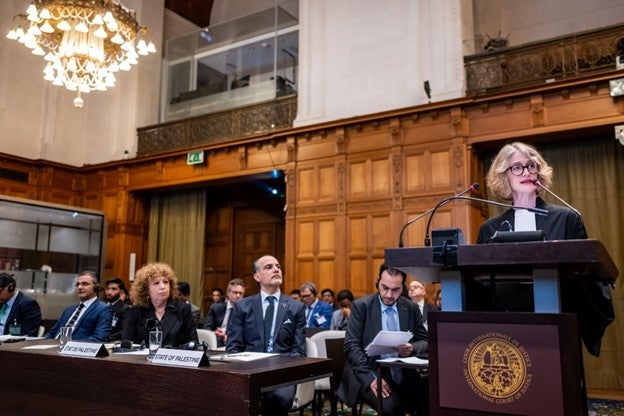
Gaza
The Promise Institute Europe remains urgently concerned about the unfolding genocide in Gaza. In addition to the overwhelming violence, suffering and loss of life, the damage to Gaza's ecosystems and biodiversity is having and will continue to have disastrous impacts. Kate Mackintosh represented the State of Palestine before the International Court of Justice in the context of the Request for an Advisory Opinion on State Responsibilities for Climate Change. She urged the court to take into account the devastating effects of conflict and occupation on the climate, and we hope that the Court will include these critical points in its forthcoming opinion. You can read the submissions here (Palestine section, p. 41) and watch the presentations here.
The scale and long-lasting impact of these attacks have led to calls for Israel’s acts to be considered as ecocide. Although ecocide has yet to be recognized as an international crime, there are existing laws that offer substantial protection for the environment in armed conflict. Under these laws, the environment is considered a civilian object, which cannot be deliberately targeted or subjected to disproportionate attacks. Such attacks are considered war crimes, under the Rome Statute of the International Criminal Court.
This analysis formed the basis of our submission to the Arms Trade Treaty Working Group on Effective Treaty Implementation in February 2024, in which we supplemented documentation of direct civilian harm by examining whether acts of environmental damage in Gaza also amounted to war crimes. The submission, which was drafted by Legal Associate Xuchen Zhang and Executive Director Kate Mackintosh, concluded that in many aspects they did. Transfers of arms which could be used to commit or facilitate a serious violation of international humanitarian law are prohibited by Article 6 of the Arms Trade Treaty.
For more information, watch this episode of Al Jazeera’s Newshour in which Kate Mackintosh discusses the effects of Israel’s attacks on Gaza’s farmland and ecosystems, and was on an episode of BBC World Service Weekend in which she discusses legal options for prosecuting environmental damage in Gaza.
More interviews on Israel and Palestine:
- Al Jazeera, “Will ICC action deepen Israel's international isolation?” (Interview with Kate Mackintosh, May 2024)
- Bloomberg Law, “Trump Defense Rests & Netanyahu Arrest Warrant” (Interview with Kate Mackintosh, May 2024)
- Al Jazeera, “Is Israel in breach of the ICJ’s order?” (Interview with Kate Mackintosh, February 2024)
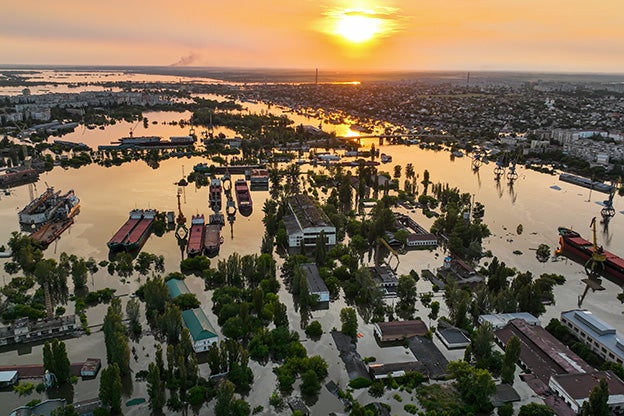
Ukraine
The Ukrainian authorities are committed to highlighting the huge environmental cost of the full-scale Russian invasion. The Promise Institute Europe has been supporting accountability for conflict-related environmental crimes in the conflict in Ukraine through provision of legal advice to the Ukrainian Prosecutor-General, academic research, and participation in conferences and online fora.
In Fall 2023, Executive Director Kate Mackintosh and former-Faculty Director Maximo Langer provided a legal opinion on prosecuting conflict-related environmental damage under the national crime of ecocide, in collaboration with Promise working group member Darryl Robinson. In January of 2024, Kate Mackintosh published a short paper on environmental war crimes in Ukraine with Ukrainian prosecutor Maksym Popov and Richard J Rogers in the Just Security online forum, and she presented related research at conferences in Ukraine in 2023 and 2024. In January 2024, Kate was appointed to the International Council of Experts on the Investigation of Crimes Committed in Armed Conflict in Ukraine. She continues to advise the Prosecutor-General on environmental war crimes strategy.
Resources, Events and Media
-
RESOURCES AND PUBLICATIONS
Reports and Briefs
- Manual on the National Criminalisation of Ecocide (February 2025)
- “A Very English Water Crisis: A Briefing on the United Kingdom’s Implementation of the ‘Safe and Sufficient Water’ Element of the Right to a Healthy Environment” (July 2024)
- “Alberta Oil Sands, Canada: Briefing Note for UN Special Rapporteur on the Right to Water” (April 2024)
- “Submission to the State Parties to the Arms Trade Treaty (ATT) regarding Environmental Destruction as War Crimes in the Situation in Gaza” (February 2024)
Articles, Papers and Book Chapters
- Book Chapter: Oldring and Mackintosh, “The Crime of Ecocide Through Human Rights: Towards Environmental Prevention, Protection and Justice” in Burgers et al. (eds.), Ecocide: Criminalising harm against the environment (T.M.C. Asser Press/Springer Verlag, forthcoming)
- Special Issue: “Ecocide, Human Rights, and Environmental Justice”, The International Journal of Human Rights (forthcoming)
- EcocideLaw Paper Series: “An International Crime of Ecocide: New Perspectives” (Promise Institute Symposium 2023)” (November 2023)
Blog Posts
- Mollie Cueva-Dabkoski, Julia Phượng Nguyễn, and Molly-Mae Whitmey, “What’s at Stake in the ICJ Hearings” on Legal Planet (December 2024)
- Rebecca Hamilton et al, “Why Criminalize Ecocide? Experts Weigh In” on Just Security (September 2024)
- Aria Burdon Dasbach, “How the ICC is Using International Criminal Law to Prosecute Suspects of Eco Crimes” on Legal Planet (May 2024)
- Richard Rogers, Kate Mackintosh and Makysm Popov, “No Longer the Silent Victim: How Ukrainian Prosecutors Are Revitalizing Environmental War Crime Law” on Just Security (January 2024)
- Kate Mackintosh, “European Parliament Votes Unanimously for Ecocide” on Opinio Juris (April 2023)
- Kate Mackintosh and Lisa Oldring, “Watch This Space: Momentum Toward an International Crime of Ecocide” on Just Security (December 2022)
- Kate Mackintosh et al, “The ICC should recognize ecocide as a an International Crime” on Project Syndicate (August 2021)
- Kate Mackintosh et al, “Symposium on the Use of International Criminal Law to Protect the Environment” on Opinio Juris (June 2020)
Podcasts
- The Just Security Podcast: “Could Ecocide Become a New International Crime?” (Podcast with Naima Te Maile Fifita, Rebecca Hamilton, Kate Mackintosh, Paras Shah and Clara Apt)
- EcocideLaw Podcast Series: “An International Crime of Ecocide: New Perspectives” (Promise Institute Symposium 2023)” (November 2023)
-
CONFERENCES, SYMPOSIA AND SPECIAL EVENTS
We host regular events engaging experts on international law, human rights, environmental justice and ecocide. To learn about past and upcoming events, click here, and be sure to follow us on LinkedIn and Instagram.
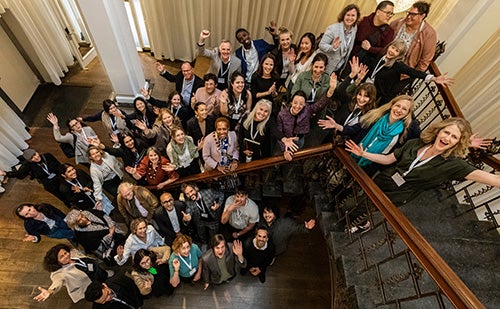
Our Launch Conference: “The Promise of International Law in the Face of Ecological Crises”
Amsterdam, The Netherlands
May 27-29, 2024This conference marked the official launch of the UCLA Law The Promise Institute for Human Rights (Europe) and brought together global leaders at a critical moment for international law, human rights and ecological justice. The three days of events highlighted recent advancements in rights of nature, ecocide law, and racial justice while fostering dialogue on climate change and environmental accountability through international courts and legal frameworks.
Read UCLA’s summary and visit our conference website to learn more, meet the speakers and watch the events, including keynote addresses by UN High Commissioner for Human Rights Volker Türk and International Criminal Court Deputy Prosecutor Nazhat Shameem Khan.
-
INTERVIEWS, MEDIA AND PRESS
- BBC World Service Weekend, “At least seventy-three people have reportedly been killed in Beit Lahia” (Interview with Kate Mackintosh, October 2024)
- Al Jazeera, “Ecocide in Gaza: A war waged on farmland and ecosystems” (Interview with Kate Mackintosh, October 2024)
- Al Jazeera, “Will ICC action deepen Israel's international isolation?” (Interview with Kate Mackintosh, May 2024)
- Bloomberg Law, “Trump Defense Rests & Netanyahu Arrest Warrant” (Interview with Kate Mackintosh, May 2024)
- Al Jazeera, “Is Israel in breach of the ICJ’s order?” (Interview with Kate Mackintosh, February 2024)
- UCLA School of Law, “UCLA Law launches institute for human rights in The Hague” (October 2023)
